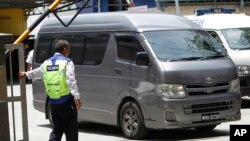A lawyer for one of the women accused of murdering North Korean leader Kim Jong Un's estranged half brother with a chemical nerve agent said Wednesday that Malaysia has potentially compromised the case and that he's afraid his client will become a scapegoat.
In an interview with The Associated Press, the attorney for Siti Aisyah said the man who he believes recruited his client was allowed to leave Malaysia late last month, after the country struck a surprise deal with North Korea.
"(He) may not be implicated in the actual event of the murder, but his evidence is so important, central to our defense because it clearly shows how this naive girl was duped into doing things outside her knowledge," Gooi Soon Seng said at his office in the suburbs of Kuala Lumpur.
Malaysian police did not immediately respond to calls for comment, but they have said in recent weeks that the deal with North Korea did not affect the investigation.
The Feb. 13 killing of Kim Jong Nam sparked a fierce diplomatic battle between two countries that once had warm relations. Aisyah and another woman, from Vietnam, have been charged with murder for allegedly smearing Kim's face with VX nerve agent at a bustling airport terminal.
Although Malaysia never directly accused North Korea of carrying out the attack, speculation is rampant that Pyongyang orchestrated a hit on a long-exiled member of its ruling elite.
The countries ended a tense standoff on March 31 with a deal that gave North Korea custody of Kim's body and allowed Malaysia to question three North Korean men who had been hiding in their country's embassy in Kuala Lumpur. Malaysian police then allowed the men to fly home, saying they found no grounds to hold them.
It was an abrupt turnaround in the investigation. Earlier, Malaysia's national police chief, Khalid Abu Bakar, had hinted that the men had valuable intelligence, saying he would wait to question them, "even if it takes five years." One of the men identified by police is Ri Ji U, known by his nickname James.
Gooi said James should not have been allowed to leave because he was key to Aisyah's defense. He said James had recruited Aisyah in early January to star in his video prank shows. Over the course of several days, he had her rub oil or pepper sauce on a victim's face, "from forehead downwards," which he would film on his phone, the lawyer said.
They practiced at malls, hotels and airports, Gooi said, speaking ahead of a court appearance Thursday by the two defendants in which prosecutors are expected to ask for the case to be moved to a higher court for the trial.
Aisyah was paid about $100-$200 for each prank and hoped the income would allow her to stop working as a social escort, Gooi said.
"She was giving up that part of her life after meeting James and being given a role in the prank show. She was quite excited," he said. "She was quite well remunerated and she was telling her friends about the fact she doesn't want to live the life of a social escort anymore."
Gooi said that in January, Aisyah flew to Cambodia, where James introduced her to a man known as Chang. He said that Chang identified himself as a Chinese who produces video prank shows for the China market, and that Aisyah did three pranks at the airport in Phnom Penh, Cambodia's capital. Chang was later identified by Aisyah as Hong Song Hac, one of four North Korean suspects who fled Malaysia on the same day Kim was killed.
Gooi said Hong asked Aisyah to do several more pranks at the Kuala Lumpur airport a few days before Kim was attacked. He said Aisyah met Hong at the airport on the day of the killing, and that Hong identified Kim to Aisyah and allegedly put the poison on her hand.
"The real culprit has escaped and the people who have been (used) become the scapegoats," Gooi said. "By allowing James to go back when he could shed light on the truth of the matter, that would have compromised the defense and that I would say constitutes a miscarriage of justice."
Although Malaysia says the three men who were allowed to leave the country have no bearing on the investigation, authorities here have asked Pyongyang to return the four North Korean suspects, including Hong, and have issued an Interpol red notice alert for them.




